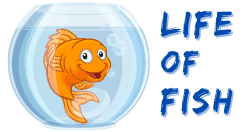In case cleaning your pond from algae is important to you, here is some information about algae eating fish for ponds.
Large algae growth or algae blooms are one of the nightmares of every aquarist. Be it an aquarium or pond, that green layers can make your whole setup ugly.
Although algae, to some extent, is healthy for your pond, a bloom isn’t. That is why you should fight against algae, and there are ways to do this. One of them is by adding special pond fish for algae.
Another possibility is using a UV filter. These filters use the power of UV light to kill any algae in your pond, leaving only healthy bacteria behind. This, however, is not an affordable choice, as you need to change the lamp every few months.
In case cleaning your pond from algae is important to you, here is some information about algae eating fish for ponds.
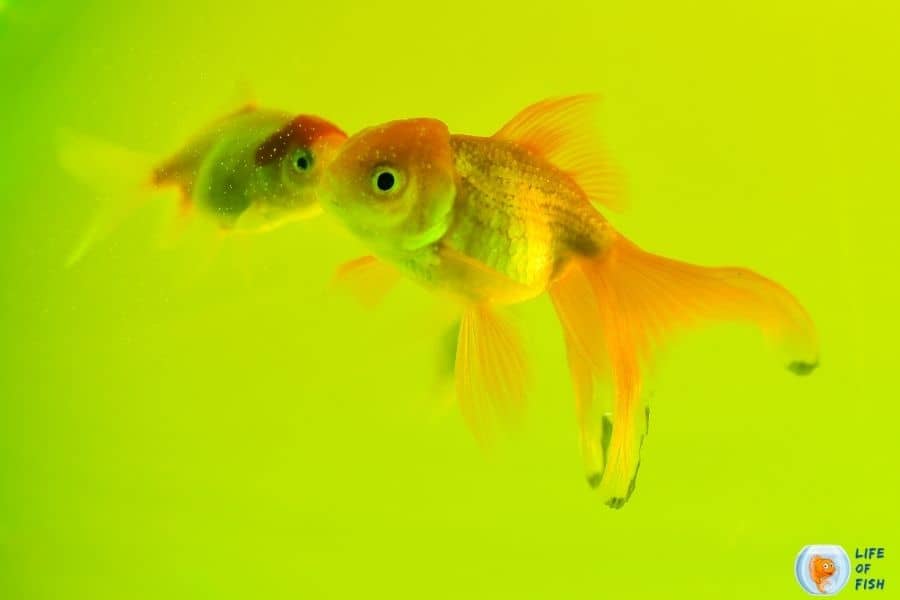
Algae eating pond fish
Jump To
The two first possibilities we gave above are the most used ones. Using a UV filter is the most effective of them, but it is also an expensive way.
The second choice is using domesticated fish that eat your algae for you. These are called algae-eating fish for ponds.
There is a wide variety of them, here is just some information about the most common ones.
Best Pond Algae Eaters
Common Pleco (Hypostomus plecostomus)
Common pleco is one of the most known algae eaters for ponds. That is not without reason. These are hardy fish that can survive in both cool and warm waters.
The adult fish can grow up to 24 inches in length, but that is something you will rarely see in a pond or aquarium.
These are very social fish, so the ideal tank for them is a big one. It should, however, be well planted. Otherwise, Hypostomus plecostomus might be too shy to come out.
Common plecos are nocturnal, so that they will be active only at night. In these hours, they love to come out and eat anything that can be found floating around, including algae.
If you have a large pleco, you can feed it all kinds of meat or fish food.
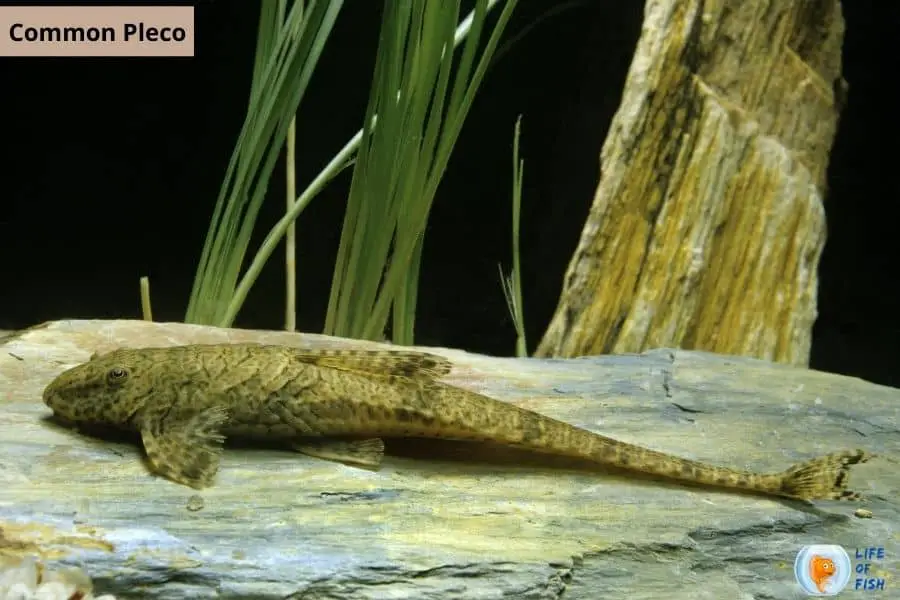
Pond Loach (Misgurnus anguillicaudatus)
Pond Loach is another type of algae-eating fish that is suitable for larger ponds. They aren’t particularly picky, so they will eat most things you offer them.
They are quite hardy and can tolerate cold waters, but it is advised to keep them in waters that are at least 60 F (16 C) degrees.
This fish has quite an attractive appearance that makes it one of the most popular fish for ponds.
These fish reach about 12 inches long, and they love to eat especially dead and decaying plants. They love to stay in groups but can stay alone as well.
Pond Loaches are peaceful fish that get along well with other pond fish and other types of loaches. F
or that reason, putting them in your pond is a good idea for not only cleaning it from algae but also keeping it balanced.
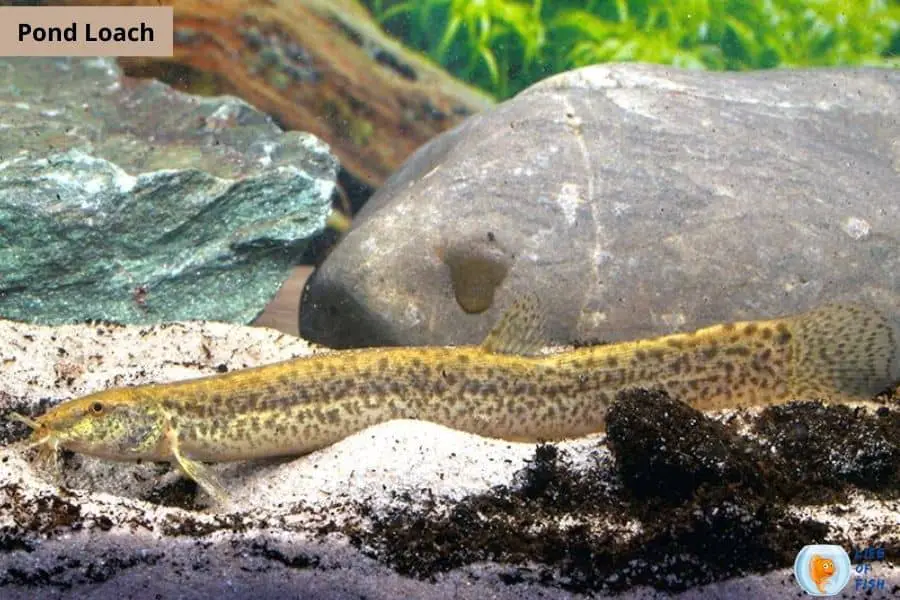
Siamese Algae Eater (Crossocheilus oblongus)
Siamese Algae Eater is one of the best algae eaters for your pond. They are not picky eaters.
They will eat most plant leaves, but they are more interested in algae. These fish will eat most algae types that most other fish will ignore, including string algae, algae clamps, and red algae.
Siamese Algae eaters grow up to 6 inches long, and they are a good choice for smaller ponds.
You can keep these fish with most other types of fish except smaller fish and more docile fish, so they brighten up every community tank or pond.
One drawback of Siamese Algae eaters is that they can not live in cold temperatures. If you live in cold weather, you will either have to add a heater to your pond or keep it in the house during winter.
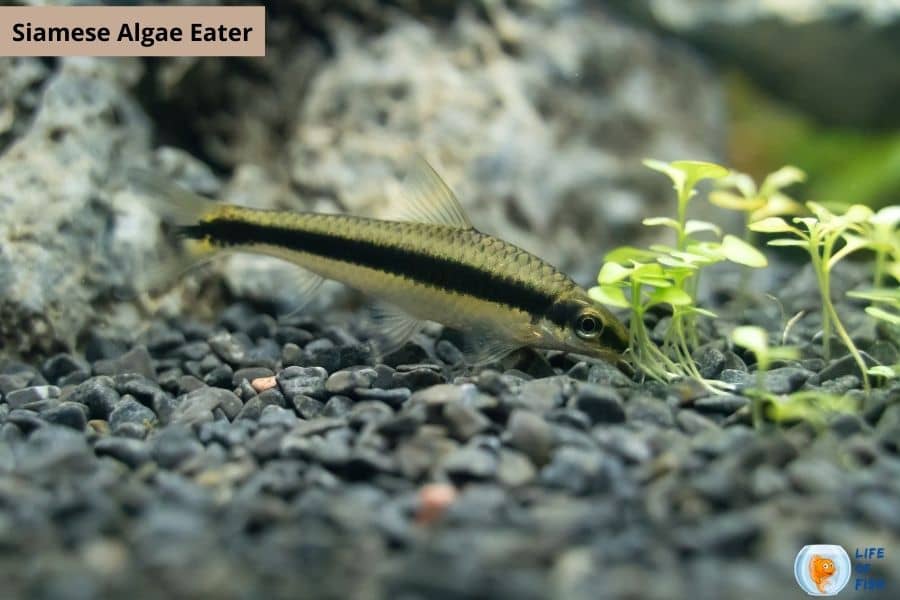
Goldfish and Koi (Cyprinidae)
Goldfish and Kois are the most popular choice of Pond keepers because of their ability to survive in cold weather.
You can keep these fish in extreme weather conditions without any problems. Although the pond’s surface freeze during winter, these fish will survive as long as the bottom isn’t frozen.
Their next best ability is to clean a pond from algae. These fish are omnivores, but they eat more plants than meat.
They will supplement their diet by eating algae off your pond, which helps keep the algae in control.
Goldfish and Koi can grow up to 52 inches long, so you must plan your pond accordingly. It is advised to put them in a pond that is at least 10 feet long.
With your large Koi, you should not keep any smaller fish with it so the former wouldn’t be stressed and hide all the time.
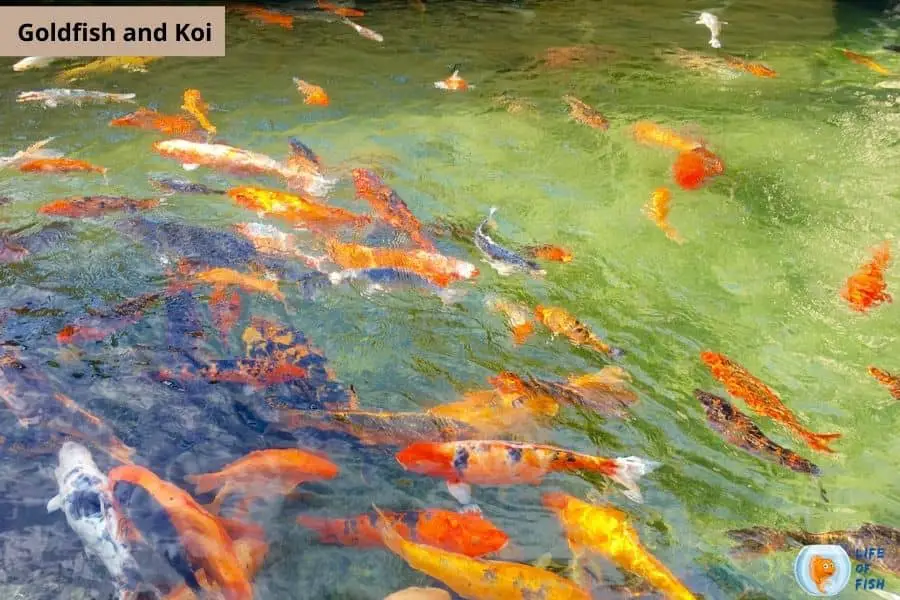
Mollies and Guppies (Poeciliidae)
Mollies and Guppies may not be the best algae eaters out there.
But if you prefer smaller fish in your pond rather than larger fish like Koi and pleco, then these are your next best choice.
Mollies and guppies are voracious eaters that want to eat all day long. So, until their feeding time comes, these fish will graze on plants and algae.
They are extremely easy to breed, so they would increase their population very quickly if you had a small pond.
Although Guppies and Mollies can live in ponds, you will have to bring them inside in winter as they can not tolerate the cold temperature.
They will do best in temperatures between 55 to 75°F. One other benefit of these fish is that they will keep mosquito larvae and other insects at bay!
However, the drawback of these fish is that you will have lots of water changing with these fish as they produce lots of waste.
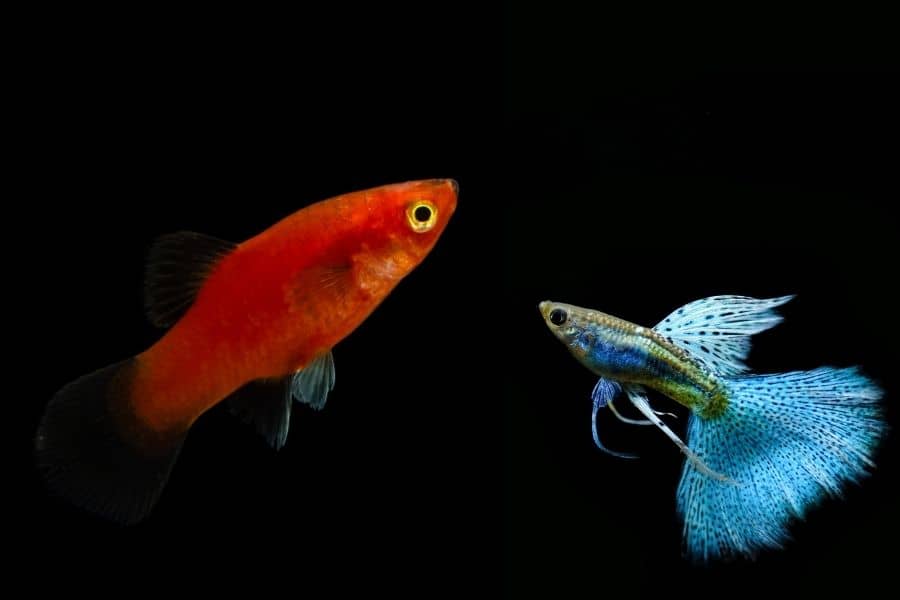
Chinese High-Fin Banded Shark (Myxocyprinus asiaticus)
Also known as Freshwater Batfish, the Chinese High-Fin Banded Shark is a good choice for people who want a fish that will help to keep their pond clean from vegetation and algae.
These fish grow up to 4 feet long but take a long time to reach their maximum size. So, you can keep them in your pond for a long time.
They are peaceful fish that won’t bother other fish, but they are better off alone.
One problem with Chinese High-Fin Banded Sharks is that they might eat your plants if there aren’t many in your pond.
If you are looking for a unique fish that will swim around the bottom of your pond while cleaning your pond, then the Chinese High-Fin Banded Shark is the right choice for you.
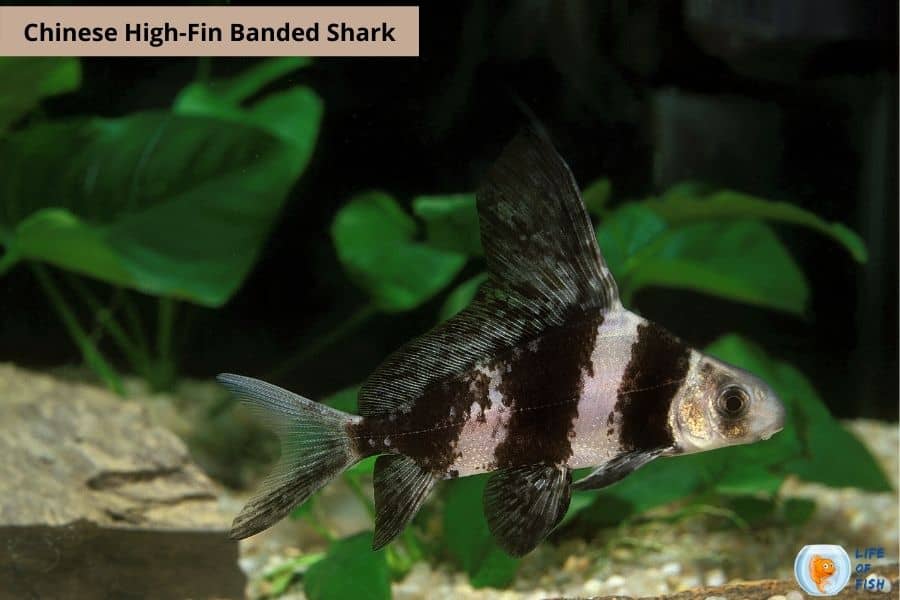
Grass Carp (Ctenopharyngodon idella)
Grass carps are considered an invasive species outside their natural habitats in Asia because of their ability to reproduce very quickly.
Large fish eat them in their native habitats, but these fish cause some problems in other countries.
Therefore, in many areas, you can keep only triploid grass carp (the carp variety that is sterilized), so keep this fact in your mind if you keep these fish.
Grass carp can get massive sized, so make sure you have a large pond to keep them.
They won’t usually consume filamentous algae, but they will eat chara (musk grass), a type of green algae.
These fish are voracious eaters and will eat plants like elodea and duckweed readily along with algae. So, be prepared to lose your plants if you keep these fish.
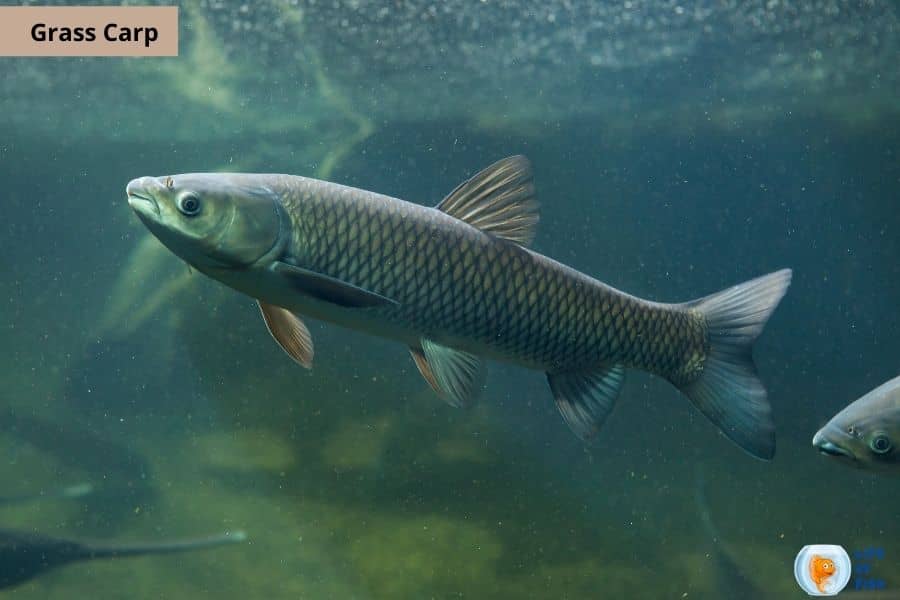
Otocinclus Catfish (Otocinclus Arnoldi)
Otocinclus Catfish is the perfect addition for a pond with a small fish community as they are ravenous algae eaters.
They grow very small, at around 1 to 2 inches long. But, they are considered the best algae eaters by many aquarium and pond owners.
They are very peaceful and active so that they won’t hide all the time. They prefer to stay in groups and get along well with other tankmates.
Because of their small size, these fish can explore around any corner and eat algae off the walls. Also, they don’t need much space to swim around.
If you have a small tank or pond, this is the perfect fish for you!
These fish eat green algae, brown algae, and biofilm, but they will not eat hair algae or black beard algae.
Because Otocinclus is usually kept in an aquarium with small fish, you must make sure that there aren’t any predatory fish in your pond if you consider these guys for a similar environment.
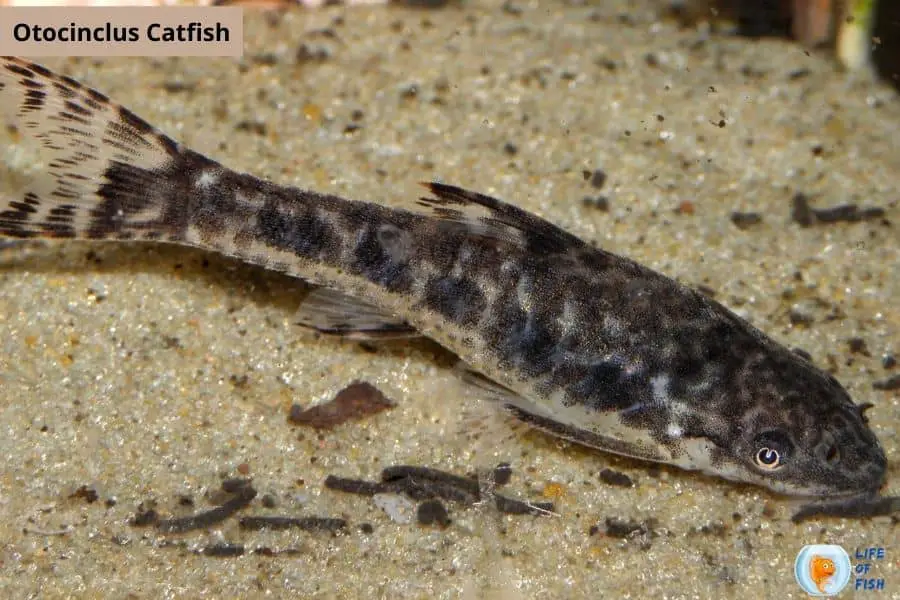
Sailfin Pleco (Pterygoplichthys gibbiceps)
Sailfin pleco is one of the best algae eaters kept in aquariums. But you can also keep these fish in ponds.
The catch, however, is you will have to take them back indoors in the winter months. Sailfin plecos are a colorful addition to your pond and are ideal for ponds with smaller fish.
But you should remember that Sailfin Pleco can grow up to 16 inches long, so ensure your pond is large enough for them!
They eat green algae, but they gladly welcome any kind of algae in their mouths. They will eat some plants too, especially those with fine leaves.
But if you have few algae blooms in your pond, these guys will eat algae for you.
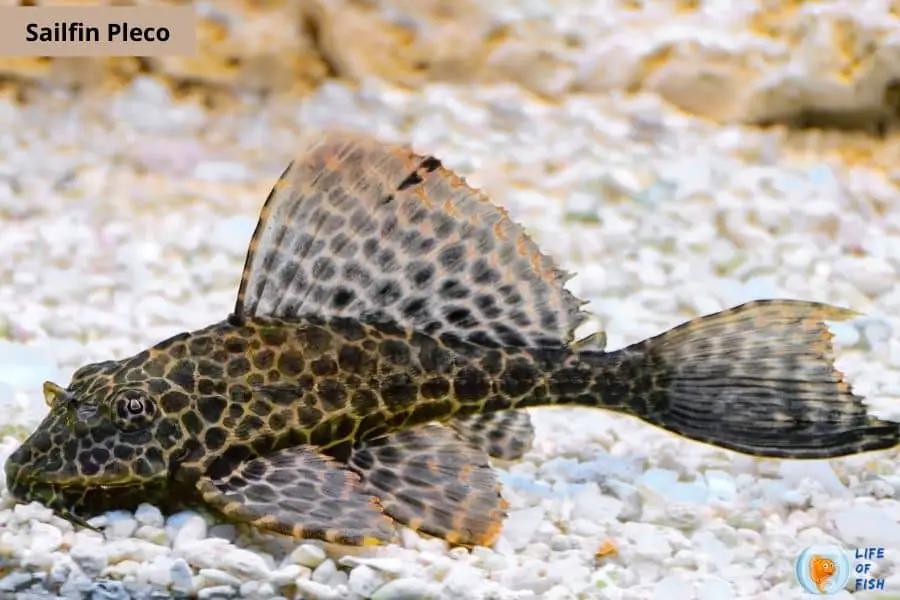
Corydoras Catfish (Corydoras sp.)
If you want a catfish that doesn’t get as big as the ones above and is peaceful, Corydoras are your best choice.
The corydoras genus includes around 161 species of tropical fish known as catfish. They are very popular in the aquarium hobby, and for a good reason.
These guys are easy to care for; they’ll eat anything (including algae), don’t bother anyone, and stay pretty small (1 to 3 inches in length).
Cory catfish are pretty hardy and even can survive in cold weather sometimes. However, to be safe, a pond heater should be provided throughout the winter months.
These catfish are best kept in groups of 3 or more individuals. So, if you have goldfishes to keep these guys company, your pond would be perfect.
Despite their small size, cory catfish are voracious eaters when it comes to algae. They will devour all the algae in your pond, so you won’t have to worry about it anymore.
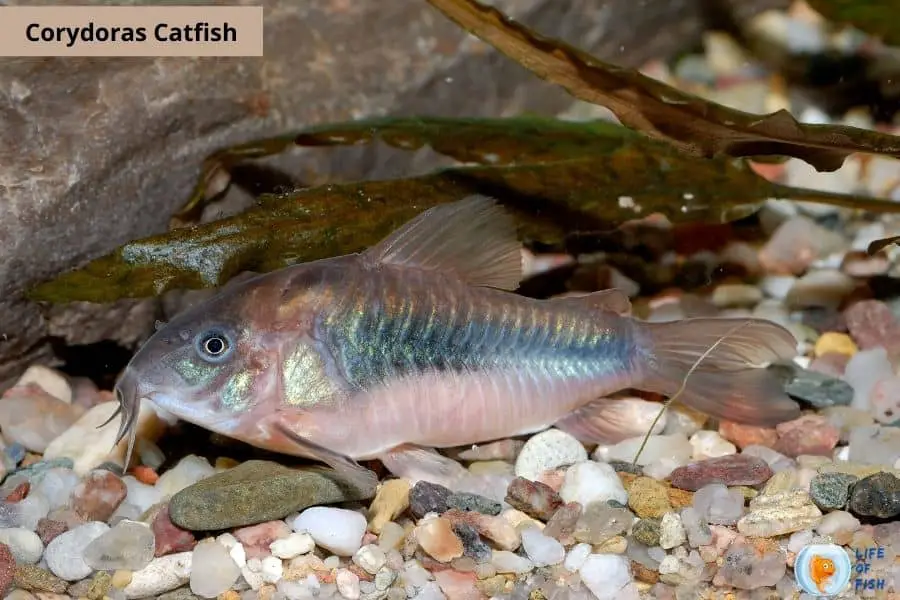
Should I remove algae from my pond?
If your pond has fewer algae, you should let it grow and don’t worry about it. These plants are beneficial for ponds with fish and also cause no harm or damage.
They help increase oxygen levels in the water, provide shade for your fish to hide from predators, and warm up the pond by breaking up light into smaller wavelengths, which fish can absorb more easily.
Also, algae are very rich in nutrients, and your fish will significantly benefit from eating them.
But if you have a lot of algae blooms, then it is best to take care of them right away. If your pond has been filled with algae for a long time, harmful nutrients will start to build up, and your fish will begin to suck in some of these toxic chemicals.
So, if you want to keep your fish healthy, you should remove the algae as soon as possible.
Finally, if your ponds have a lot of black algae, for example, it is best to get rid of them right away.
Black algae grow fast and are more challenging to remove than other types of algae.
If you have a lot of algae blooms, you can use algaecides to remove them. But be aware: algaecides come with a warning label, and you should carefully read the instructions before using them.
Warning: Algaecides can adversely affect your fish and plants (especially if you don’t use them according to the instructions). It is recommended to leave this job to professionals.
Can algae eaters live in outside ponds?
Some algae eaters like Koi and Goldfish can live in outside ponds all year long, even in the winter.
But, some of the smaller algae eaters like plecos, snails, and shrimp need a heated pond to survive in the winter.
If you have a pond outdoor, it is best to have a larger pond heater. Also, you should increase the amount of oxygen in the water by adding proper aeration devices.
Conclusion
Algae eaters are an excellent addition to any pond, but it is always best to plan ahead.
Ensure you have enough space for the type of algae eater you want to keep and check if it needs a heated pond or not.
If your pond is not large enough for the algae eater you want to keep, then maybe a smaller one is the way to go. It is important to research which type of algae eater is best for your pond.
If you are unsure if the algae eater you want to get will eat all the algae in your pond, it is best to go with a larger one.
Big algae eaters like the common pleco and Goldfish can keep your pond clean all year long, but be aware that these fish can grow very large.
Sometimes you might want to go with the smallest algae eater possible since they are easier to maintain and don’t really kill your pond’s ecosystem.
Be sure you know all the pros and cons about each type of algae eater before getting one.
Read Next : Super Easy Beginner Guide Of How To Keep Algae Out Of Pond?
Read Next : Do Guppies Eat Plants And Algae? Important Insight Into Guppy Feeding
Read Next : Will Vinegar Kill Algae In A Fish Tank : Step By Step Guide
